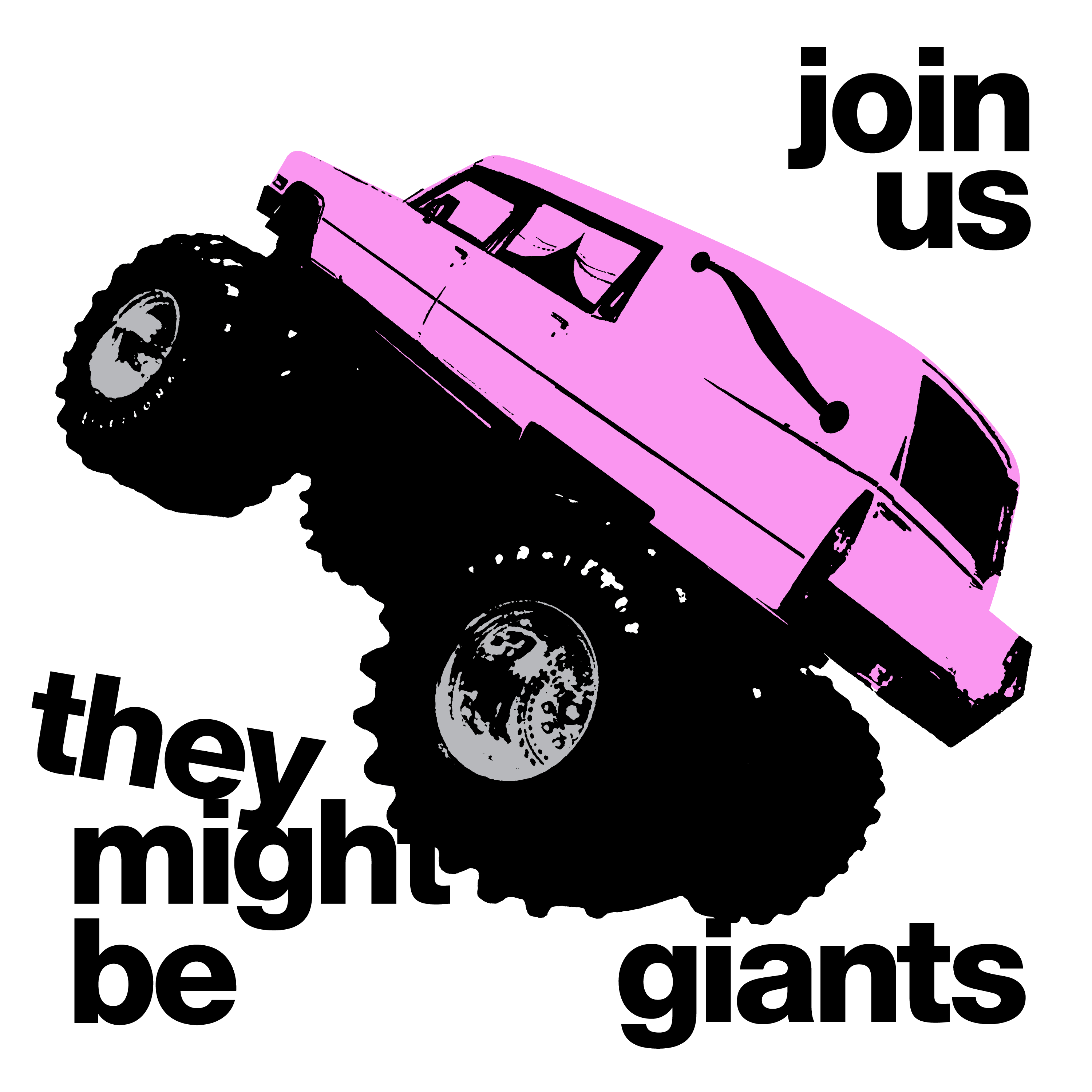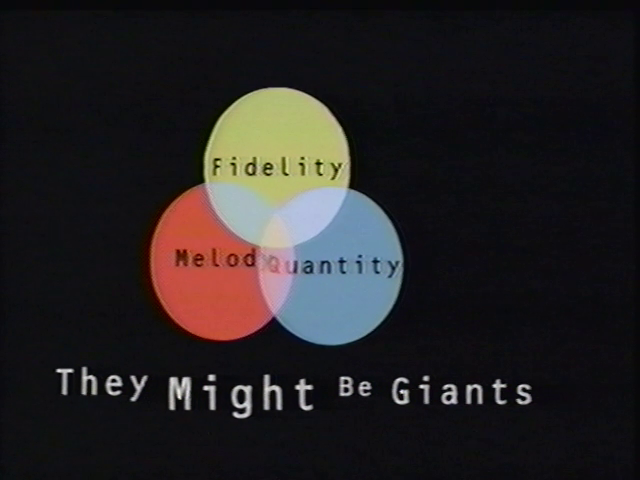
| release year | 2011 |
|---|---|
| type | album |
| listened to on | 2025-05-12 |
| new to me? | no |
| favorite | Spoiler Alert |
| links | spotify, tmbw |
You hear the cataclysmic discharge of the optimist. They say you are going to live forever. They're damn right.
Join Us is perhaps TMBG's most spiteful album. It heralds the beginning of a new era for the band, one dominated by quantity, by excess, by flooding; they are going big and they are not going home. It's at this point that I have to, as in Mink Car, discuss the arc of a rock band. There is one thing that a rock band has to do in order to become a thing of legends. Do you know what it is? We're about to find out.
First, the album cover and title. I don't think it's a coincidence that the albums that we consider to be the beginning of "eras" of They Might Be Giants history all have cars on the cover. The Pink Album has cartoons, excess, and business portrayed in a satirical light. Everyone's lining up to see what's going to happen. Mink Car, on the other hand, has a sleek disassembly of a car and a person; stripping it down to its bare components to see what ticks. It's a hard reset, one that's new, easily compartmentalized, and deeply manufactured.
Finally, Join Us is a pink monster truck hearse. The pink, notably, is roughly the same shade of pink on the cover of The Pink Album, but a little bit hotter. It's big, it's imposing, and it's... reminiscent of something, isn't it? It brings you back to those old days, the days that people say the band peaked in, that run from The Pink Album to Apollo 18, which is something that TMBG has a complex relationship with (see Nanobots for that emotion). It is impossible to ignore. It exists in a state of sheer quantity.
It's at this point that we have to talk about the Power Spheres, originally used in promotional materials for Apollo 18.

These are what the Johns call the "core elements" of They Might Be Giants' music, and in my opinion, each era reflects a different one. The Pink Album through Long Tall Weekend reflects melody, as they get their bearings. Mink Car through The Else reflects fidelity, experimenting with new sounds, new production, and commercialization. We are now strictly in quantity with Join Us. They are going to keep making as much as they can for as long as they can, and they are going to do so with the realization that they have one thing left to do.
You Can't Keep Johnny Down, after all. This song exists entirely out of spite, and existing out of it. The "Johnny" exists here as our narrator, talking about everyone who's ever wronged him. He goes as far as to say that one of them has pissed himself. He despises these people, those who decried him. He exists because people tried to put him down, simple as. It sets the tone of the entire album: one that's based in existence-as-negation, as well as simultaneous self-aggrandizing and acknowledgement that one's time is highly limited.
From here, we get songs about existing in hostile environments and getting burnt out: the run of You Probably Get That A Lot through Canajoharie is not just about spite, but about detachment from spite. It's at this point that the lyrics of this album go insane: Melting down some army guys to make green tea, If you can draw it in the air / Or write it down, then you weren't there / What's gone is mute, et cetera. This entire album probably has TMBG's strongest lyricism maybe ever.
The image of a cephalophore exists on You Probably Get That A Lot, which is a person carrying around their severed head. It is from this that we begin to see Join Us's obsession with defying death. The narrator of this song does not care that people are carrying around their own heads. He's interested in this particular girl, despite everyone around carrying their heads around like keepsakes. This is banal to him now. This continues on Old Pine Box, which is about a burn-out, but it's not sung by a burnout; it's about someone who's too tired to stop, who's been at it for years.
Did I mention that this was released twenty-nine years into TMBG existing as a band? Not just that, but it's been 43 years since TMBG was formed at the time of writing. John Flansburgh just turned 65.
Canajoharie is a real location, that's somewhat north of the Johns' summer homes. Call them sentimental, but they want to go back. I wonder what that could mean.
From there, we get Cloisonné, a song with intense drum loops and synths that almost sound like a rubber ball falling. Up until this point, we have never used the word "quirky" in one of these, but it's difficult to not describe Cloisonné as quirky. It's supposed to be quirky. The process of cloisonné is an ancient enameling technique used to decorate metalwork, and combined with the sounds of these synths that almost seem reflective of what other people think TMBG is, this song becomes an interesting reflection on the process of artistry that They Might Be Giants puts into their work.
Let Your Hair Hang Down reminds me of an old punk-rocker. It's difficult to describe why acoustically — I'm no music theorist — but it gives me the vibe. The Rapunzel reference is almost definitely intentional, though I couldn't tell you why. Who said to put the fire out?
From there, we get Celebration. You need some time to get louder and not by yourself in this one — it's a song about leaning on others, about writing in a rehearsal hall if we're being literal. It references Hieronymus Bosch, a painter known for surreal, dream-like landscapes in the 1400s-1500s. Many figures in Bosch's paintings were not literal, and featured deformed shapes. It's difficult to not interpret this as self-referential: again, it strikes the imagery of people's perception of They Might Be Giants in opposition to what they actually are.
I have bumped In Fact and When Will You Die? for ages. First off, In Fact just has intense lyricism; this mess is a hook that drags me along, a self-deprecating song that starkly contrasts with the self-aggrandizing that's come up until this point. It sets us up for the second half of the album, one that takes the manic creative energy and begins to question how long it will last. This change solidifies with When Will You Die?, which is about what it says on the tin. I'd like to add something, though: whenever anyone asks the Johns about this track and who it's about, they always say "it's about someone in this very room".
I do not think they are lying. I think it is about someone in the room, someone who's always there regardless of the question. In case it wasn't obvious, this is the last thing that They Might Be Giants needs to do in order to fulfill the arc of the rock band. They Might Be Giants must die.
Judy Is Your Viet Nam feels like it could be about Twin Peaks: The Return, in a kind of anachronistic sense. In that same anachronistic sense, the song is very confused about time: it's about the 90s, it's about Vietnam, it's about ten years from now. The narrator of this song does not have an excellent grasp on time anymore; they are missing something, some hole, and they do not know what it is. From there, we get Never Knew Love; the daydreams are gone, but you're still learning. Somehow.
We get more into the theme of heroes and stories with The Lady And The Tiger, based on a short story by Frank R. Stockton. This classic myth, however, is thrown onto its head; there is no choice, because the choices are talking to each other. They no longer know when someone's going to come here to make a choice, they've been here for ages. They don't know what they're waiting for; they've fulfilled their purpose. All they have left to do is to die, but they need to die shooting laser beams; more displays of comical excess, of quantity.
Spoiler Alert. A duet. The truck — that on the cover — is driving out of Flans's mind as Linnell begs for an ending. The truck seems to have a mind of its own. It is steering itself now; it is what it is. Do either of the Johns need to behind the driver's seat? Will it crash and bring The End Of The Tour, when the road disappears? They'll only stop when the road disappears, after all. This song is notable for being an exceptional duet and the best on the album, which is why there's only one favorite here. It's both of them. Continuing on this theme of control is Dog Walker; you were once a dog walker (in control) but you will soon be a dog.
What is the future trying to tell you? 2082 is almost a sci-fi short story about receiving impenetrable messages from the future. They do not know if what they are doing is right.
...Three Might Be Duende is maybe the most impenetrable thing that TMBG has ever put out. If you aren't actually listening to these albums as we put these out, at least listen to this track, I beg you. I can't possibly hope to decipher all the wordplay here, but my interpretation is this: each verse of this song is an era. The first verse is pre-album; he's a worthy emcee, but he'll never be part of the three (eras). The first team member, Necropolis Blownapart, is hatching a dastardly plan, with its anti-capitalist themes and wearing its inspirations on its sleeve, but it's trapped in its time now. Apocaryphal Espadrille shapes dreams and returns to the scene with a charming drama, one that reaches mainstream success, but it is ultimately a fool's errand. Finally, our current member, Dystopio Smashedtobits, is the keeper of dust. It takes the blown-apart apocarypha and becomes sleep's older brother: death. Only upon that will the trio become complete. Only then will Three Might Be Duende at last; because the only thing stopping TMBG from becoming duende, the stuff of legends, is the fact that they are not dead.
So what do you do with this? Well, with the acknowledgement that You Don't Like Me, a song that I consider to be about avoiding parasociality, TMBG offers the option to... well, Join Us, to continue their death-march into stardom. They are going to do it with or without you. What do you say?